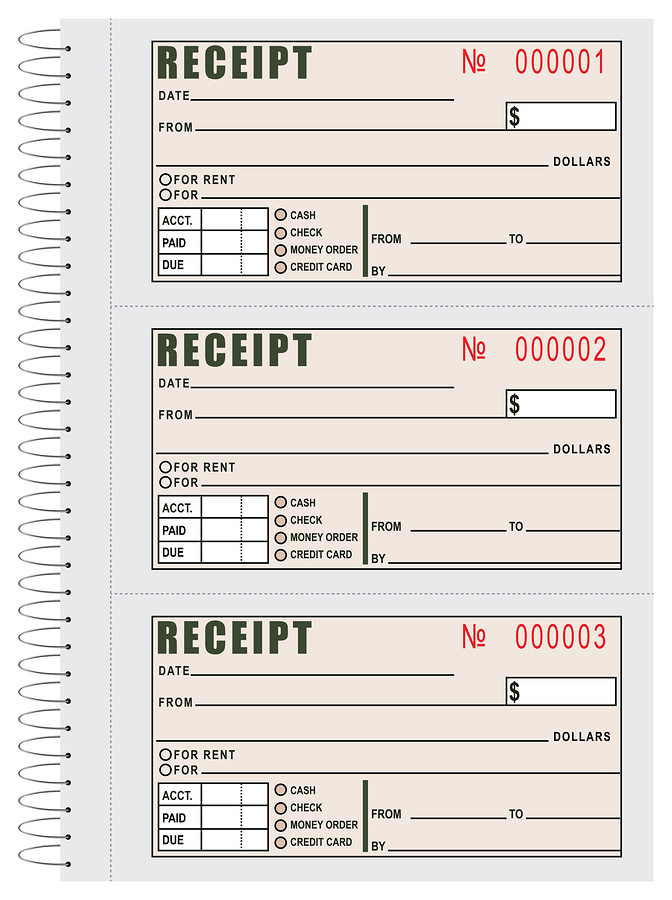
For some small businesses a simple wire bound receipt book is all you need to substantiate your income.
Now some people may be wondering, “Why would I want to prove I have more income than I have to?” But for many small business owners, that’s exactly the problem—you have income, you want to report it to the IRS, and you’re having a hard time proving it. This post is for you.
The number two reason for reporting your non-1099 income (number one of course being basic honesty) is qualifying for the Earned Income Tax Credit. 2011 sort of hit small business owners who normally qualify for EIC with a one-two punch. We had the new 1099 reporting requirements that upped the ante for so many businesses, and we had the new EIC tax preparer due diligence rules with one of the questions being “Do you have forms 1099-MISC to support the income?” With the next question being, “If not, is it reasonable that the business type would not receive Form 1099-MISC?” Here’s a clue: if you answered NO to the first one, you have to answer YES to the second.
So what types of businesses wouldn’t normally receive a 1099? Bunches of them! Face it, if you’re reading this—I’m guessing that your business doesn’t receive 1099s. Generally, it’s reasonable to expect that anybody who works for other people, as opposed to other businesses, would not receive a 1099. House cleaners, dog walkers, handymen, lawn mowing services, daycare providers, interior decorators, and even income tax preparers are all types of business that could easily never see a 1099. (Yeah, me too! Although I’m now getting 1099k forms because I take credit cards, I don’t get 1099-MISC for preparing personal tax returns. Maybe I’ll see some 1099-MISC forms from some of my business clients this year, but I never used to get them in the past.)
So, how does a small time personal service provider prove his or her income to the IRS? There are a couple of things you can do. I’m going to start with my favorite: the business bank account. This is what I do and several of my clients do it too. (Okay, because I’m their accountant and this is what I tell them to do.) Get an Employer Identification Number (EIN) for your business and set up a separate bank account for your business in your business name. Only business income goes in, only business expenses go out. You may have to put some of your own money in for a start up, and once you’re making money you’ll take out a draw, but you’ll label those as such. Other than those two items, your business checking account is pretty much your profit and loss statement as well. Now for a bigger company that would be over simplifying things, but for us little folks–I’m spot on. See this post for more information about getting an EIN number: Free EIN
Why does this make good proof? Because you’ve got a monthly record of your income and expenses. I also have deposit slips to back it up: Mary Jones paid me $200, Fred Smith paid $250. It’s a good solid audit trail. Here’s another post about bookkeeping and your business bank account: Banking and Bookkeeping
But what if you don’t have a separate account? Maybe your business is just too small to bother with the expense of an extra account. What if you’ve just got something really simple like watching the little neighbor kid for a couple of hours after school every day. There’s no contract, no business cards, no advertising. You get $100 a week from your neighbor friend. She pays you in cash—it never sees the inside of a bank because that’s your grocery money. It’s not much but it supplements your child support. How do you prove that kind of income?
The easiest way to prove your income if you provided child care is to have the person you provided it for claim your services on their tax return. You make them a daycare receipt, just like the ones regular day cares do showing the name of the child, how much they paid you and your EIN number. (You can use your social security number but I never recommend that. You can get an EIN number for free. Protect yourself.) This is doubly good because the IRS will get confirmation of your income from an outside source. You prove income, your customer gets a tax deduction, it’s a win/win situation.
But what if your business isn’t day care? What if you did something like mow lawns around the neighborhood and shoveled snow in the winter? Nobody’s going to be claiming you on their tax return, what can you do? In your case, I like receipt books. You can find different kinds at Office Max or any office supply store. I like the ones with a carbon copy—one for you, one for your customer.
Now if you have just one customer and you’re always going to the same place—you can just use the little one that just has a couple of lines and the amount on it. You might write, “Mowing, Mr. Jones, $30, 5/15/2012” on it. You know what you did, who you did it for, how much you got paid, and when. If you have multiple customers you’ll want the larger receipt books that include the address and phone number of the customer. If you do different types of jobs for different people, you might need the bigger ones so you can write down the type of work that you did for them as well.
You don’t have to have a 1099-MISC to prove your income to the IRS. You just need to have a system in place to document your income and you’ll be fine.
